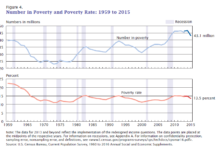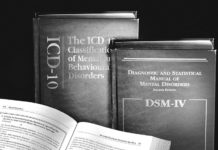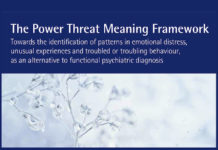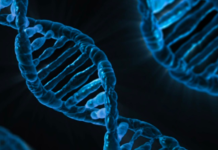Researcher Critically Examines Movements for Global Mental Health
China Mills raises concerns that global mental health movements obscure social determinants of health and naturalize Western mental health concepts.
Antidepressant Use May Increase Risk of Hip Fractures in Older Adults
Study finds antidepressant use is linked to increase in hip fractures in community-dwelling older adults with and without Alzheimer’s disease.
Psychotherapy is Less Effective and Less Accessible for Those in Poverty
A special issue explores the connection between poverty, mental health, and psychotherapy.
“Veterans Let Slip the Masks of War: Can This Art Therapy Ease PTSD?”
“Service members suffering from PTSD often feel like they’re wearing a mask,” Samantha Allen writes in Invisible Wounds. Melissa Walker, an art therapist, asks them to make one. “The results are stirring. One mask, striped in red and black with hollow chrome-colored eyes, is wrapped in razor wire with a lock where its mouth should be.”
Just Me: A Series of Reflections on Trauma, Motherhood, and Psychiatry
It took coming off psychotropic drugs completely for me to become awake. I had the doctor I was seeing wean me off, though she didn’t want to (instead she suggested I take different drugs.) But here I am almost two years later and I am feeling all of my emotions and managing them well. I knew best what I needed, and I trusted myself. Life has shown me that I can endure many trials and tribulations without giving up, and I trust myself today to reach out for help if I need it.
Violence, Depression in Parents Linked to Kids’ ADHD, Depression
A prospective study of 2,422 children from 2004 to 2012 found that children whose parents reported Intimate Partner Violence (IPV) and depressive symptoms were...
The Gig Economy Celebrates Working Yourself to Death
In this piece for The New Yorker, Jia Tolentino discusses how the gig economy driven by apps such as Uber and Lyft leads employees to overwork...
Reintroducing Spirituality Could Address the Mental Health Crisis
From The Independent: Society's cycle of compulsive consumerism and materialism is partly to blame for Britain's mental health crisis. Instead of merely referring people to...
Police Killings Vicariously Impact Mental Health of Black Americans
New research provides evidence that police killings of unarmed Black Americans impact the mental health of Black Americans.
Psychosocial Adversities Should be Included in Diagnosis
Proposal to include psychosocial adversities that impact mental health in ICD and DSM diagnoses.
Time’s Up: Culture of Denial Impacts Mental Health of Sexual Abuse Survivors
Study finds that not believing sexual abuse survivors often leads to self-blame and mental health issues.
The Power Threat Meaning Framework One Year On
The team that developed the Power Threat Meaning framework as a diagnostic alternative reflects on the response to the framework after one year.
Playing Up the Benefits of Play at Work
From the Association for Psychological Science: New research has found evidence that play at work is associated with less fatigue, boredom, stress, and burnout in...
Lancet: Let’s Stop Fighting, Assume the Best about Psychiatrists’ Intentions
If there is one downside to the field of mental health, declares an editorial in The Lancet Psychiatry, "it is the failure of pleasant,...
Choosing a Specialty: A Letter to a Medical Student
In this letter to a medical student considering pursuing psychiatry as a specialty, psychiatrist Nassir Ghaemi cautions that unlike other medical specialties, psychiatry can...
“Too Many PA Foster Children are on Psychiatric Meds”
For Philly.com, staff writer Stacey Burling reports on the PolicyLab analysis of psychiatric drug use among Pennsylvania children on Medicaid. “Many children in foster...
“Tylenol in Pregnancy Tied to Behavior Problems in Children”
For the New York Times’ Well blog, Nicholas Bakalar reports on a new study, in JAMA Pediatrics, that found that using acetaminophen (Tylenol) during...
U-M Team Concludes Bipolar Disorder Has Many Causes
From Science Magazine: After studying over 1,100 individuals diagnosed with bipolar disorder for 12 years, a University of Michigan research team has found that no...
Situational Schizophrenia
The label of schizophrenia has a chilling ring. It carries with it the suggestion of a wrecked and wretched life. It is also a diagnosis that is notoriously difficult to shed. For this reason, the diagnosis of schizophrenia should not be applied lightly and not without a thorough understanding of the patient’s family and wider circumstances.
School Culture May Contribute to Overdiagnosis, Study Finds
Officials at a school that was more focused on ADHD diagnoses described children’s behavior in terms of individual illnesses, taking children out of the context of their social interactions, race, gender, and socioeconomic status.
Brain Science Doesn’t Explain All
In an essay in the Sydney Morning Herald, a psychiatrist explores how the same blind faith in reductionist economic models that lead to a global...
“Mental Illness Mostly Caused by Life Events Not Genetics, Argue Psychologists”
According to psychologists, “mental illness is largely caused by social crises such as unemployment or childhood abuse.” If this is so, why are we...
Philosopher Raymond Tallis – Challenging Pop Neuroscience
There's a widespread belief in psychiatric and mental health circles that human experience can be reduced to the biology of brain chemistry -- the "medical model." But this is just the tip of the iceberg: our whole society is in the grips of a faddish pseudo-science of "neuromarketing," "neuropolitics" "neurotheology," and 'neuroeconomics."
Loss of a Parent in Childhood Raises Psychosis Risk
Children who lose a parent before the age of 3 are 84% more likely to experience psychosis as adults, according to research published in...
Conversations About Death . . . in Pursuit of Life
For most parents, addressing the topic of death is an uncomfortable proposition. Yet, it may be one of the most important discussions we have with our children. Our lifelong response to death often affects our mental and physical health. We must teach our children practices from an early age that can buffer the unavoidable distress that would come if the worst occurs.






















